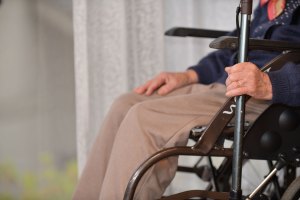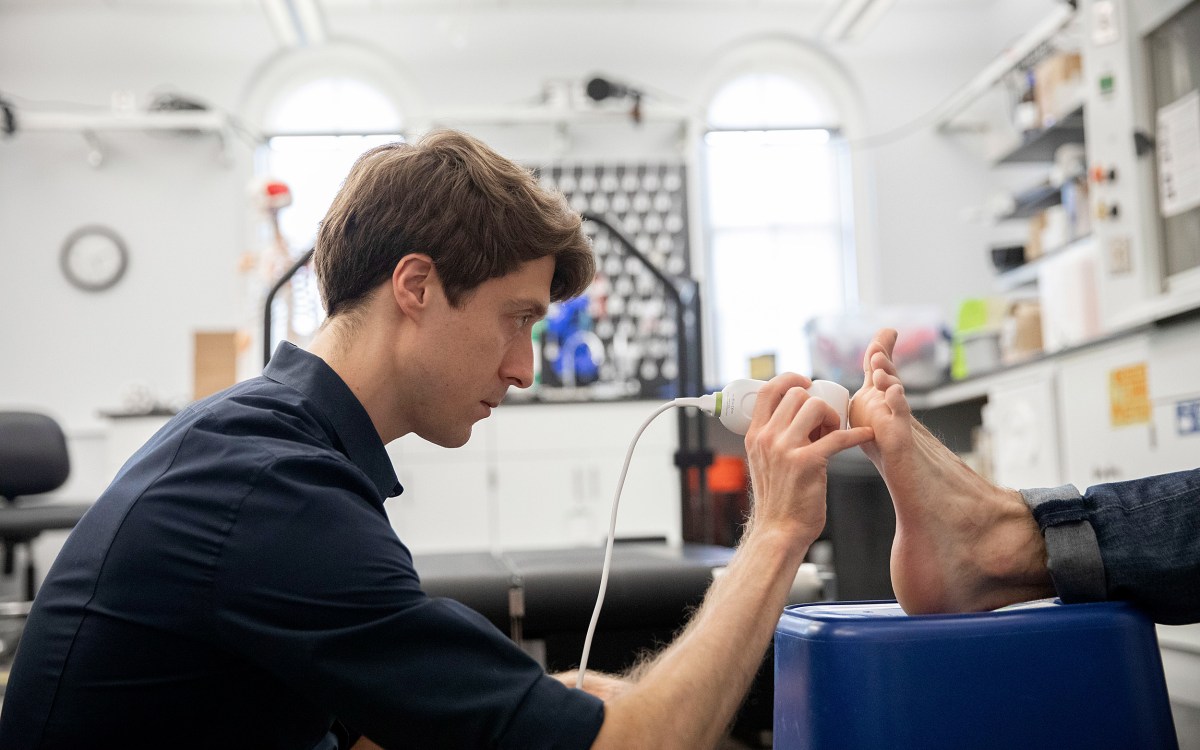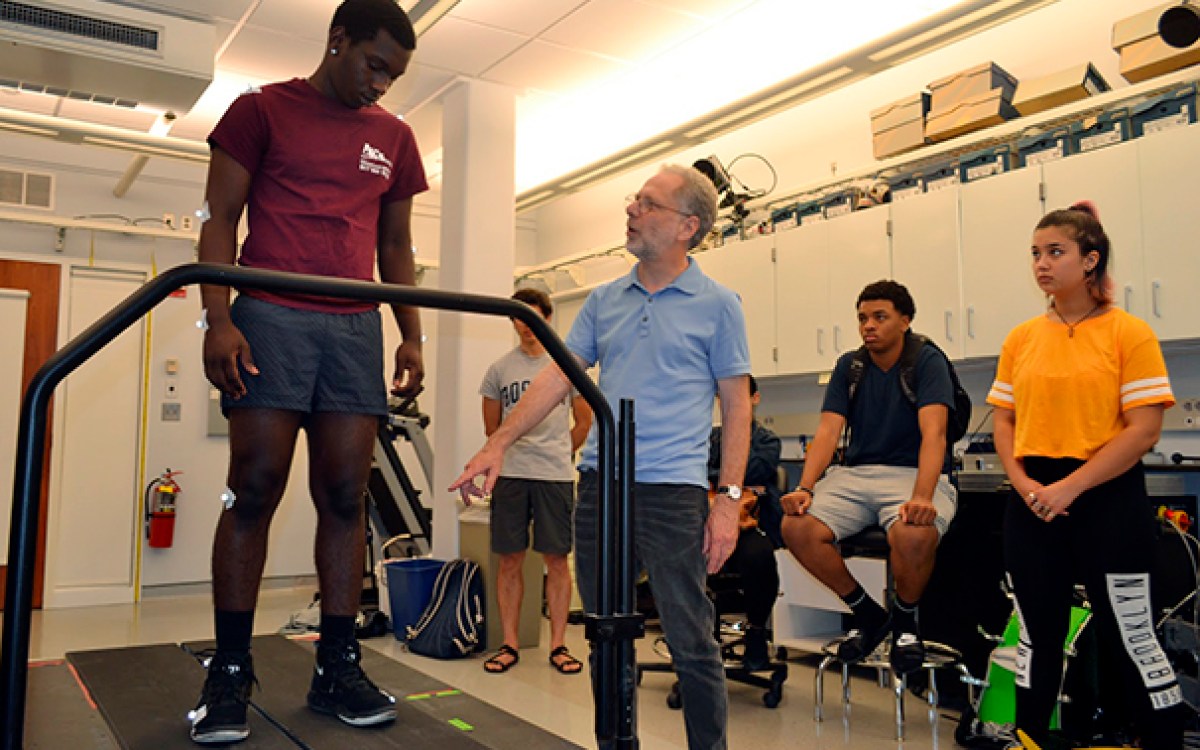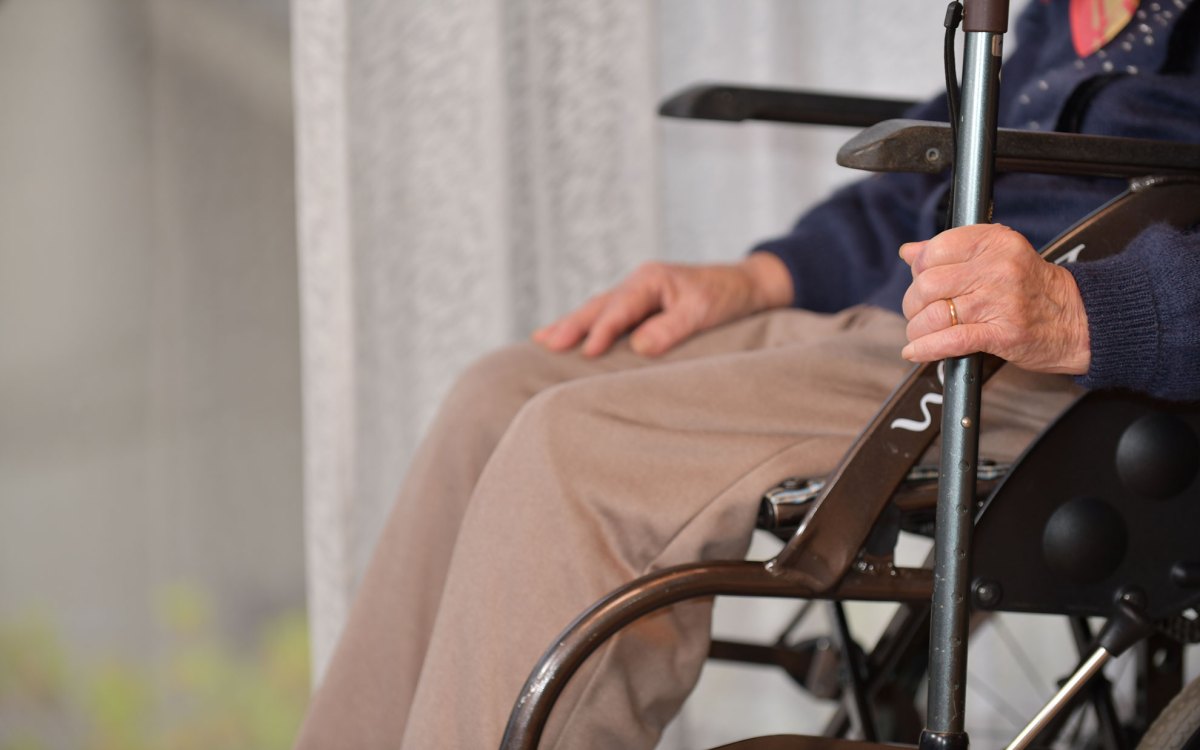Why run unless something is chasing you?
Exercise is something humans never evolved to do (but is healthy nonetheless)
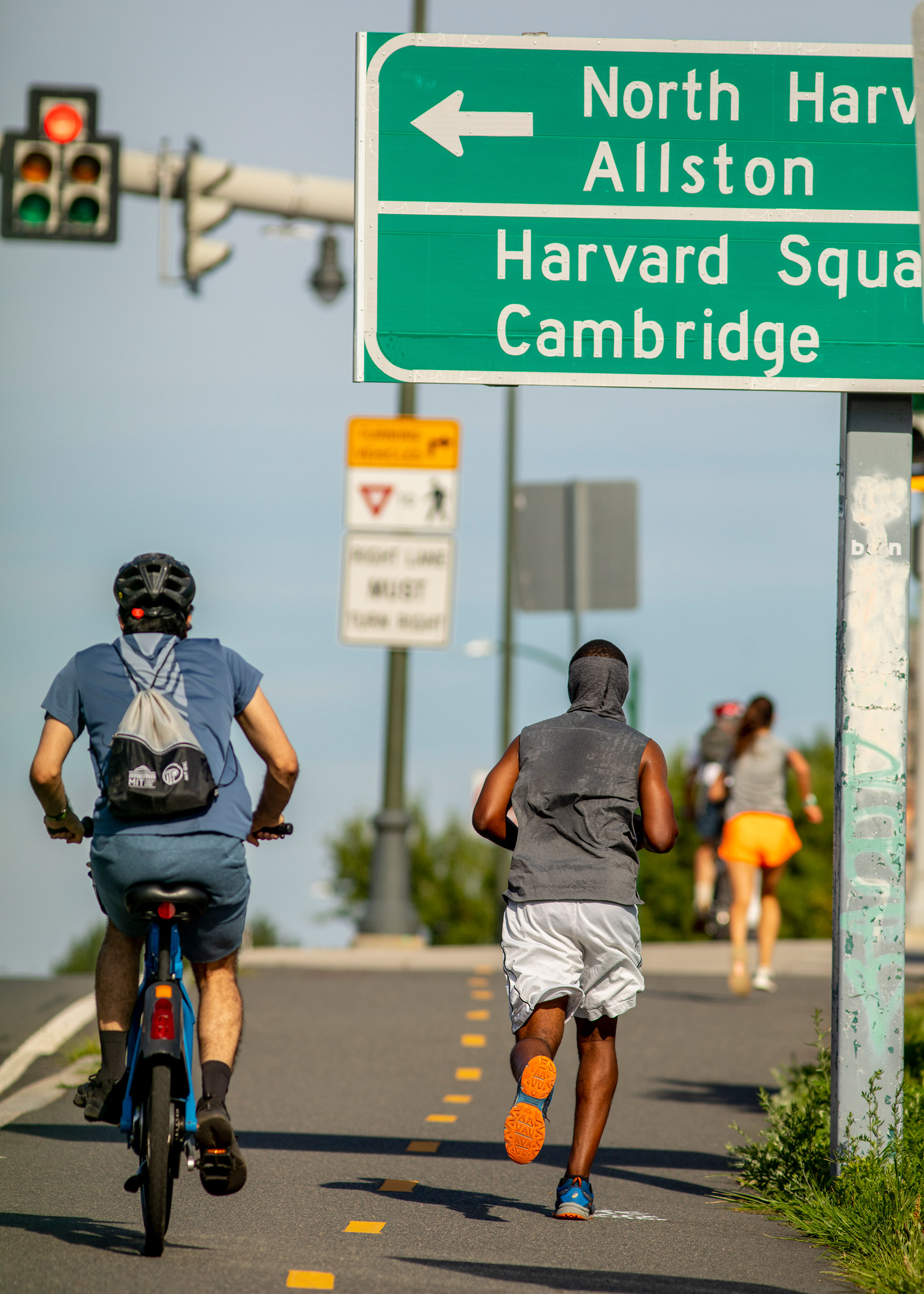
Rose Lincoln/Harvard Staff Photographer
Do you tell yourself when you don’t feel like exercising that you’re just being lazy? Actually, Harvard evolutionary biologist Daniel E. Lieberman ’86 says, we’re nearly hard-wired to avoid unnecessary exertion. In his new book, “Exercised: Why Something We Never Evolved to Do Is Healthy and Rewarding,” Lieberman explores this idea while using anthropological evidence to bust other myths and misunderstandings about exercise. The Gazette spoke with Lieberman, the Edwin M. Lerner II Professor of Biological Science, about the book and tips for getting motivated to do something as unnatural as exercise.
Q&A
Daniel Lieberman
GAZETTE: The biggest myth you address in the book is that it’s normal to exercise. Introduce this idea.
LIEBERMAN: We live in a world where everyone knows that exercise is good for you, and yet the vast majority of people have a hard time doing it. According to government statistics, only about a quarter of Americans actually exercise in their leisure time. For me, it’s clear we’re asking people to choose to do something that’s inherently abnormal in the sense that we evolved not to do it. Humans evolved to move. We evolved to be physically active. But exercise is a special kind of physical activity. It’s voluntary physical activity for the sake of health and fitness. Until recently, nobody did that. In fact, it would be a kind of a crazy thing to do because if you’re a very active hunter-gatherer, for example, or a subsistence farmer, it wouldn’t make sense to spend any extra energy going for a needless five-mile jog in the morning. It doesn’t help you. In fact, it actually takes away precious calories from other priorities. All in all, humans have these deep-rooted instincts to avoid unnecessary physical activity, because until recently it was beneficial to avoid it. Now, we judge people as lazy if they don’t exercise. But they’re not lazy. They’re just being normal.
“The [Harvard Alumni Study] found that older Harvard alums who were exercising had about 50 percent lower mortality rates than their classmates who were sedentary, and that the benefits of exercise were much higher in older than younger alumni.”
GAZETTE: How can people get around these natural instincts?
LIEBERMAN: Since medicalizing and commercializing exercise is obviously not working, I think we can do better if we think like evolutionary anthropologists. Here are three things people can do. The first: Don’t be mad at yourself. Don’t feel bad for not wanting to exercise, but learn to recognize these instincts so you can overcome them. When I get up in the morning to go running, it’s often cold and miserable, and I have no desire to exercise. My brain often tells me all kinds of reasons why I should put it off. I sometimes have to force myself out the door. My point here is to be compassionate about yourself and understand that those little voices in your head are normal and that all of us, even “exercise addicts,” struggle with them. A key to exercising is to overcome them.
The second way in which we can kind of help ourselves is to remember we evolved to be physically active for just two reasons (and this is what a lot of the book is about). We evolved to be physically active when it was necessary or socially rewarding. Most of our ancestors went out to hunt or gather every day because they would otherwise starve. The other times they were physically active was for fun pursuits like dancing or playing games and sports. These are fun things to do and have some social benefits. If we want to help ourselves exercise, we need to have that same mindset. Make it fun, but also make it necessary. One of the most important ways to make it necessary is to do it socially, like being part of a running group. The obligation makes it fun, social, and necessary.
The final anthropological approach that can help is not worrying about time and how much exercise you need. There is a myth that we evolved to be perpetually active, run marathons, and be so bulked up we can lift giant rocks with ease. The truth is far from that. Our ancestors were reasonably but not excessively active and strong. Typical-hunter gatherers engage in only about 2¼ hours a day of moderate to vigorous physical activity. They aren’t extremely muscular, and they sit as much as we do, nearly 10 hours a day. Further, a little bit of physical activity is enormously salubrious. Dose response curves show that just 150 minutes of exercise a week — only 21 minutes a day — lowers mortality rates by about 50 percent. Knowing that, I think, can help people feel better about doing just a little exercise instead of none.
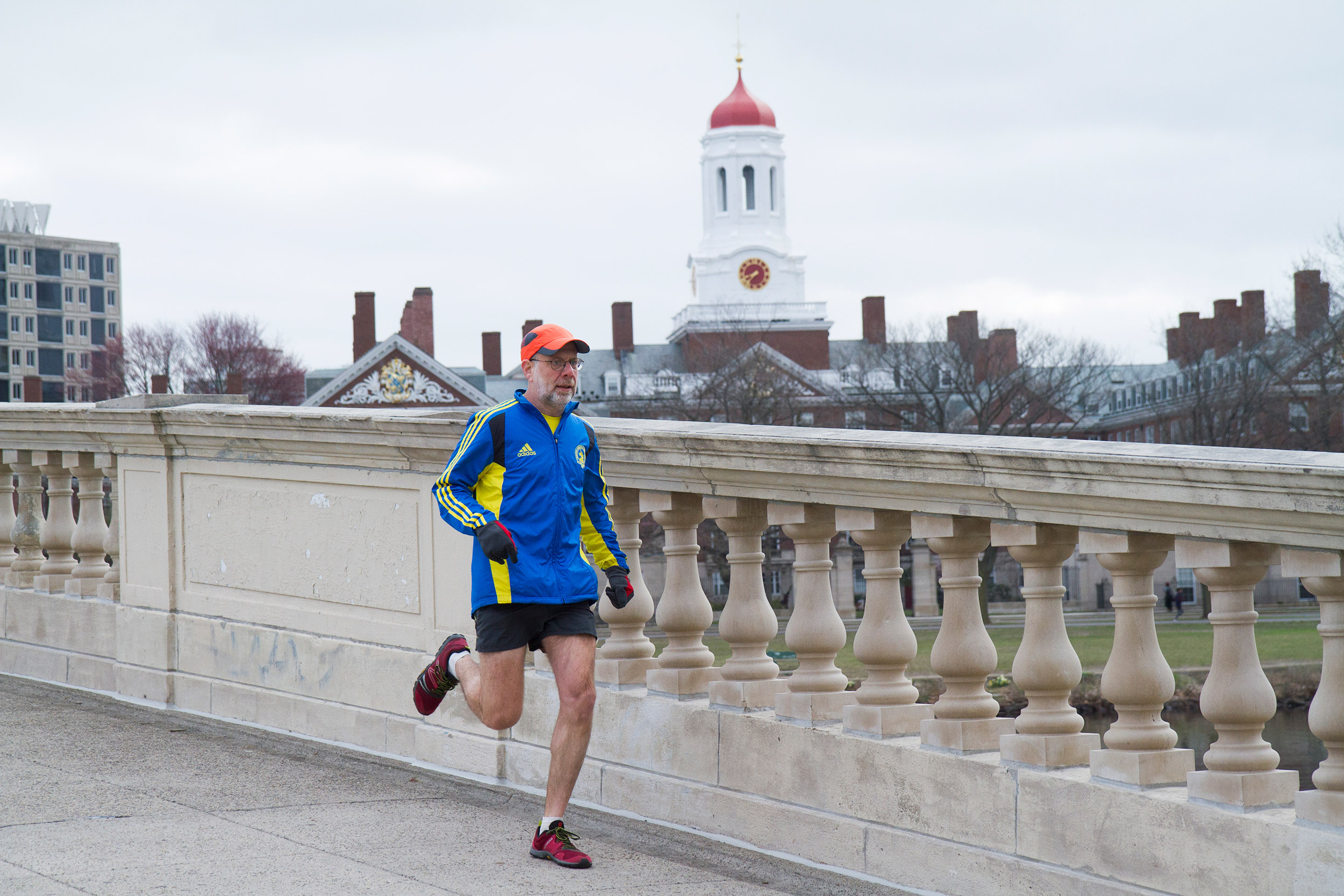
“When I get up in the morning to go running, it’s often cold and miserable, and I have no desire to exercise. I sometimes have to force myself out the door, ” says Daniel E. Lieberman, pictured during a pre-pandemic run.
Jon Chase/Harvard file photo
GAZETTE: You explore some other big myths in the book with anthropological evidence backing you. Let’s talk about a few. Will running eventually wreck your knees?
LIEBERMAN: That one’s an old chestnut, and it’s just so distressing to hear over and over again. It is true that knee injuries are the most common running injuries. So yes, there’s an association between running injuries and knee problems. But most of the knee injuries that people get from running can be treated and, even better, can be prevented by learning to run properly and adapting your body, especially by strengthening muscles in your hips and legs. I think we could avert a lot of injuries by treating running as a skill. The other problem that people mistakenly worry about is osteoarthritis. Osteoarthritis, unfortunately, is untreatable and a serious problem, but the notion that running causes knee osteoarthritis is not supported by the evidence. There are multiple compelling scientific studies which show that runners are not at greater risk of getting this disease and, if anything, running is slightly protective. Of course, once you do have arthritis, then running can be very painful and can exacerbate it. But let’s dispel the scary myth that running will give you arthritis.
GAZETTE: Is it normal to exercise less as we age?
LIEBERMAN: I think this is the most important myth that I bust in the book. We invented the concept of retirement in the modern Western world, and along with that the notion that once we hit 65 it’s normal to take it easy. But that was never true for our ancestors. There was no such thing as retirement in the Stone Age. In fact, until recently, it was the opposite, because hunter-gatherer grandparents often work harder than parents foraging for surplus food that they provide to their children and grandchildren. We evolved to be physically active throughout the entire lifespan. And in turn lifelong activity helps us live longer and stay healthy as we age. This is because physical activity turns on a broad range of repair and maintenance mechanisms that counter the effects of aging. A consequence of this evolutionary legacy is that of all the times to be less physically active, probably the worst is as we get older, because being sedentary deprives us of all those anti-aging mechanisms activated by exercise. Study after study shows that the health benefits of physical activity become more important, not less important, as we age. In fact, the first major study to show this definitively was the Harvard Alumni Study led by Ralph Paffenbarger. That study found that older Harvard alums who were exercising had about 50 percent lower mortality rates than their classmates who were sedentary, and that the benefits of exercise were much higher in older than younger alumni.
GAZETTE: Is sitting really that bad for us?
LIEBERMAN: This is another example of how the oversimplified way we think and talk about health and physical activity can create confusion. We’ve so demonized being a couch potato that sitting has been called “the new smoking” and it is widely assumed that until recently no one sat very much. But surprise, surprise, when researchers study modern-hunter gatherers, they sit about 10 hours a day, just as much as most Americans. Demonizing something as normal as sitting isn’t very helpful. A much better approach, a more sophisticated approach (which I explore in the book) is to realize that there are better and worse ways to sit. One is to sit more actively. While we evolved to sit a lot, we didn’t evolve to sit motionless for hours on end, and there is compelling evidence that it is helpful to interrupt your sitting on a regular basis. If you are working at a desk, get up every once in a while, fidget, go get yourself a cup of tea, whatever. Those regular, frequent interruptions turn on your muscles and other aspects of your metabolism just enough to lower levels of blood sugar and fat and counteract other negative effects of being sedentary. It’s bit like turning on your car engine. However, it is true that sitting is a problem if that’s all you do. Leisure-time sitting is far more strongly associated with poor health outcomes than work-time sitting. So, if you sit a lot during work but also sit a lot in the mornings, evening, and on weekends, all that sedentism is going to be a problem. All things considered, it’s unhelpful to equate sitting with smoking. Unlike smoking, it’s perfectly normal to sit. It shouldn’t be a source of shame to use a chair and a standing desk isn’t a substitute for exercise. Just don’t spend all your day in a chair. But who doesn’t know that?
Daniel Lieberman will discuss his new book, “Exercised: Why Something We Never Evolved to Do Is Healthy and Rewarding,” at a virtual event 7 p.m. Tuesday. The Harvard Science Book Talks series is a collaboration between the Harvard University Division of Science, Harvard Library, and Harvard Book Store. This event is co-sponsored by The Leakey Foundation.
This interview has been edited and condensed for length and clarity.


